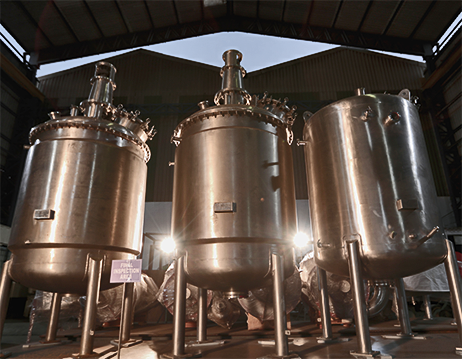Why Should You Consider Pressure Vessels for Your Industry?
What is a Pressure Vessel?
Pressure vessels have become ubiquitous in modern society and are largely unnoticed by the general population. Industrial pressure vessels are essential for continuous processing and manufacturing. As a result, they can have a direct impact on society's physical and economic well-being. In the realm of manufacturing and processing, pressure vessels play an important role.
Without them, manufacturing and industrial plants would be far less effective. This is why, for their pressure vessels, every industry should choose a reputable pressure vessel manufacturer.

Pressure vessels are extremely important for holding elements (semi-solids, liquids, and gases) at particular pressures. They are used in a variety of industries, including petrochemical, oil and gas, chemical, and food processing.
Types of Pressure Vessels
Storage Vessels:
For industrial applications, storage vessels are used to hold liquids and gases. The vessel might be used to store finished goods like compressed natural gas (CNG) and liquid nitrogen, or it could be utilized to contain fluids in a later process. The most common material for storage tanks is carbon steel.
Heat Exchangers:
Heat exchangers are devices that allow heat to be transferred between two or more fluids. The food, pharmaceutical, energy, and bioprocessing industries all employ them. The thermal and flow properties of the fluids engaged in heat exchange, as well as the thermal property of the conductive partition, all influence the operation of heat exchanger equipment.
The temperature difference between the hot and cold fluids, as well as the internal pressure enclosing the fluids, put stress on the materials in a heat exchanger.
Boilers:
Boilers are heat-transfer devices that use fuel, nuclear, or electrical energy as heat sources. They are usually made up of an enclosed vessel that permits heat to be transferred from a source to a fluid. They're mostly used to warm up liquids. Inside the boiler, phase transition of the fluid from liquid to vapor occurs often. The boiler's vapor is used for a variety of heating purposes as well as power generating.
Steam boilers produce steam at a high pressure to accelerate the turbine blades. As a result, the boiler vessel must be extremely strong in order to withstand such high pressures and temperatures. The strength of the bulk of materials decreases as the temperature rises.
Process Vessels:
Process vessels are a type of pressure vessel that falls into a broad category. Mixing and agitation, decantation, distillation and mass separation, and chemical reactions are all carried out in these containers. The nature of the process and the transformation of the substances involved determine the change in the internal pressure of a process vessel.
What is a pressure vessel manufacturer, and what do they do?
To fabricate pressure vessels that comply with regulations and desired specifications, pressure vessel manufacturers adhere to strict engineering standards. To stay within regulatory requirements, they employ certified welders and fabricators, as well as perform non-destructive testing, radiography, and ultrasonic testing.
If there are any potential chemical interactions between the contents of the vessel and the vessel itself, liners and/or vessel material choices must be considered. Pressure vessel manufacturers also store and ship their vessels carefully after construction and testing to avoid post-fabrication damage.
Three Reasons to Select only ASME Pressure Vessels
A code for pressure vessel manufacturers has been established by ASME (American Society of Mechanical Engineers). The ASME standard lays out guidelines for the design and manufacturing of pressure vessels in order to ensure their safety, lifespan, and functionality.
ASME standards are developed by a group of specialists from all around the world who work in a range of locations and conditions. And, as a professional association that promotes the value of mechanical engineering, the ASME's reputation and success are dependent on the performance of these standards. As a result, ASME pressure vessel codes assure of:
Quality:
If a pressure vessel fails to work due to poor build quality, the vessel is considered useless. Basic quality and performance flaws can quickly escalate into larger liabilities that no one wants to bear. ASME has 12 parts that perfectly address these challenges. You can rest assured that ASME-certified pressure vessels and boilers will meet demanding quality standards.
User and Environment Protection:
Quality leads to safety, and ASME pressure vessels are no exception. The ASME Boiler and pressure vessel codes help to increase the tanks' dependability, safety, and operational efficiency. These standards have not only prevented mishaps over the years, but they have also assisted business owners in reducing their environmental effects by minimizing leaks and accidents.
Consistency across Borders:
More than a hundred countries accept ASME codes. As a result, adhering to appropriate ASME BPVC codes while designing and producing pressure vessels ensures consistency across foreign markets.
For your better understanding, we've tried to cover the basics of what pressure vessels are, the types of pressure vessels, what a pressure vessel manufacturer does, and the significance of ASME pressure vessels. We hope that this information has helped you understand why pressure vessels are important for your industry and how to choose a pressure vessel manufacturer.
Please feel free to leave any more comments if there is anything else.
Advertise on APSense
This advertising space is available.
Post Your Ad Here
Post Your Ad Here
Comments